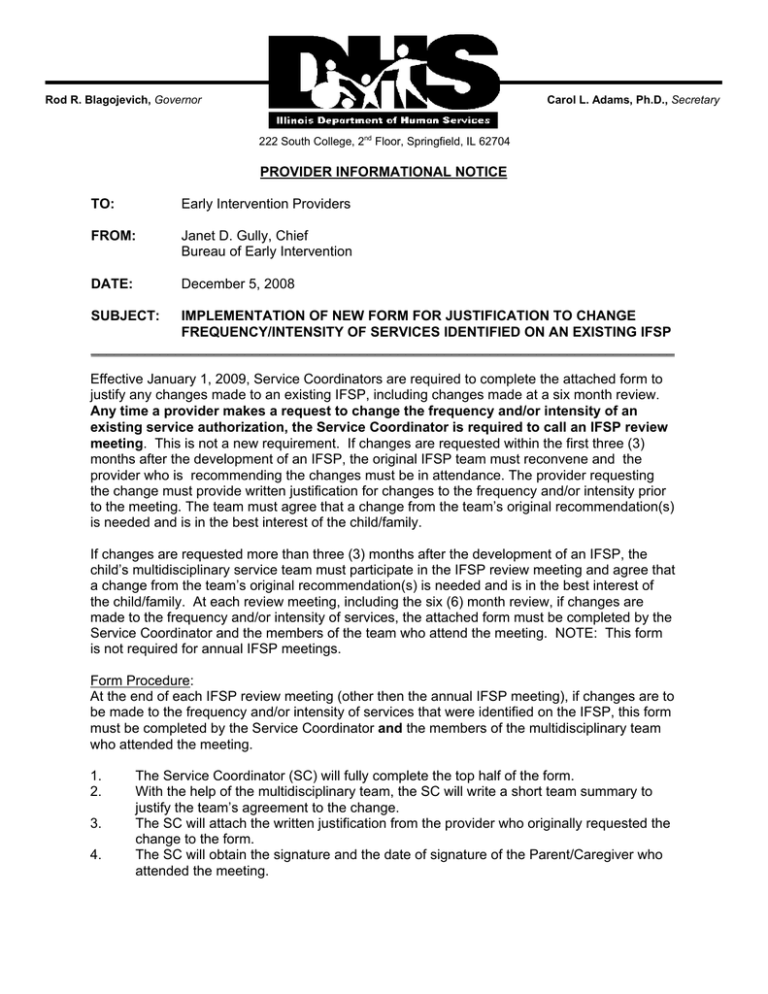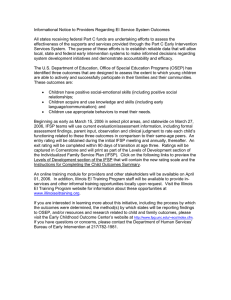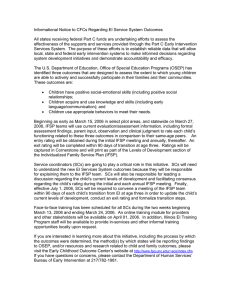PROVIDER INFORMATIONAL NOTICE TO: FROM: DATE:
advertisement

Rod R. Blagojevich, Governor Carol L. Adams, Ph.D., Secretary 222 South College, 2nd Floor, Springfield, IL 62704 PROVIDER INFORMATIONAL NOTICE TO: Early Intervention Providers FROM: Janet D. Gully, Chief Bureau of Early Intervention DATE: December 5, 2008 SUBJECT: IMPLEMENTATION OF NEW FORM FOR JUSTIFICATION TO CHANGE FREQUENCY/INTENSITY OF SERVICES IDENTIFIED ON AN EXISTING IFSP ____________________________________________________________________________ Effective January 1, 2009, Service Coordinators are required to complete the attached form to justify any changes made to an existing IFSP, including changes made at a six month review. Any time a provider makes a request to change the frequency and/or intensity of an existing service authorization, the Service Coordinator is required to call an IFSP review meeting. This is not a new requirement. If changes are requested within the first three (3) months after the development of an IFSP, the original IFSP team must reconvene and the provider who is recommending the changes must be in attendance. The provider requesting the change must provide written justification for changes to the frequency and/or intensity prior to the meeting. The team must agree that a change from the team’s original recommendation(s) is needed and is in the best interest of the child/family. If changes are requested more than three (3) months after the development of an IFSP, the child’s multidisciplinary service team must participate in the IFSP review meeting and agree that a change from the team’s original recommendation(s) is needed and is in the best interest of the child/family. At each review meeting, including the six (6) month review, if changes are made to the frequency and/or intensity of services, the attached form must be completed by the Service Coordinator and the members of the team who attend the meeting. NOTE: This form is not required for annual IFSP meetings. Form Procedure: At the end of each IFSP review meeting (other then the annual IFSP meeting), if changes are to be made to the frequency and/or intensity of services that were identified on the IFSP, this form must be completed by the Service Coordinator and the members of the multidisciplinary team who attended the meeting. 1. 2. 3. 4. The Service Coordinator (SC) will fully complete the top half of the form. With the help of the multidisciplinary team, the SC will write a short team summary to justify the team’s agreement to the change. The SC will attach the written justification from the provider who originally requested the change to the form. The SC will obtain the signature and the date of signature of the Parent/Caregiver who attended the meeting. 5. 6. 7. 8. The SC will obtain the signatures and date of signatures of each provider who attended the IFSP review meeting in person. If a provider attended the meeting via a phone call, the Service Coordinator will PRINT THAT PROVIDERS NAME ON THE FORM AND PUT THEIR (Service Coordinator’s) INITIALS NEXT TO THE PROVIDERS NAME. This will verify that a provider attended the meeting via a phone call. The SC will obtain the signature and the date of signature from the CFC Program Manager. The SC will file the form in the child’s CFC Permanent Case Record under Section 2.0, Service Plans. Additional Steps Required When a Change to an Existing IFSP Occurs: 1. The SC and multidisciplinary team will link all changes in frequency/intensity of service to the functional outcomes identified on the IFSP. 2. The SC will complete the required steps identified in the CFC Procedure Manual under the following section. Section - Individualized Family Service Plan; Sub Section Required Six Month Review. For Your Information: When a CFC is monitored for the period that includes the effective date for use of the attached form, the monitors will have a report from the CBO that identifies increases and/or decreases in authorized services that have occurred between initial and annual IFSPs. The monitors will look for this form in a child’s file based upon that report. Attached for your information and review are the “Principals of Early Intervention” that were developed by the Illinois Interagency Council on Early Intervention. Please review this document thoroughly and strive to base your recommendations for services upon the principals identified in this document. When making recommendations for services keep in mind that each child is a unique individual and that the amount of service identified as a need for each child should be based upon the individual child and not upon a prescribed set of services. More hours of direct hands on services to a child by a provider does not always ensure that a child will make progress. Progress is more likely to occur when a parent/caregiver learns to embed intervention strategies into family routines. That is accomplished through a collaborative relationship between parents/caregivers and direct service providers. In addition, professionals involved in the eligibility determination process need to adhere to eligibility rules and the principles of the program. Doing so ensures that Early Intervention funds are appropriate utilized and all eligible infants/toddlers receive the services they need. If a child does not meet the eligibility criteria, he/she must be found ineligible and referred to other community resources. Thank you for taking the time to review these documents and for your continued participation as a provider of services for the Early Intervention Services System. Attachments CHILD AND FAMILY CONNECTIONS JUSTIFICATION TO CHANGE FREQUENCY / INTENSITY Date of IFSP Review: Child’s EI #: Child’s Name (Last, First): Child’s Date of Birth: CFC Office #: Service Type: Service Location: Original Intensity: Original Frequency: Revised Intensity: Revised Frequency: IFSP Team Summary of Justification: (Attach required written justification from provider who made change request) We, the undersigned members of the Individualized Family Service Plan (IFSP) for the child stated above, participated and agree that a change from the originally recommended intensity and/or frequency is needed and it is in the best interest of the child. Parent / Caregiver Date Provider / Discipline Date Service Coordinator Date Provider / Discipline Date Provider / Discipline Date Provider / Discipline Date Provider / Discipline Date Provider / Discipline Date CFC Program Manager Date CFC Program Manger acknowledges that SC held IFSP change meeting and that Provider written justification for change is attached: Under the provisions of the Illinois Mental Health and Developmental Disabilities Confidentiality Act, the Family Educational Rights and Privacy Act, 20 USC 1232g, and the Health Insurance Portability and Accountability Act of 1996, information collected hereunder may not be redisclosed unless the person who consented to this disclosure specifically consents to such redisclosure or the redisclosure is allowed by law. Rev 12/08 Principles of Early Intervention 1) Children in need of Early Intervention (EI) services are identified and can access services. 2) The primary goal of EI is to support families in promoting their child’s optimal development and to facilitate the child’s participation in family and community activities. 3) The focus of EI is to encourage the active participation of families in the therapeutic process by imbedding intervention strategies into family routines. It is the parents who provide the real early intervention by creatively adapting their child care methods to facilitate the development of their child, while balancing the needs of the rest of their family. 4) EI requires a collaborative relationship between families and providers, with equal participation by all those involved in the process. An on-going parent-professional dialogue is needed to develop implement, monitor, and modify therapeutic activities. 5) Intervention must be linked to specific goals that are family-centered, functional, and measurable. Intervention strategies should focus on facilitating social interaction, exploration, and autonomy. 6) Intervention shall be integrated into a comprehensive plan that encourages transdisciplinary activities and avoids unnecessary duplication of services. The plan shall be built around family routines, with written home activity programs to encourage family participation in therapeutic activities on a daily basis. 7) Intervention should be monitored periodically to assure that the strategies implemented are successful in achieving outcomes. 8) Children and their families in the Early Intervention System deserve to have services of highest quality possible. High standards will be set for the training and credentialing of administrative and intervention staff. Training, supervision, and technology will be focused to achieve excellence.


